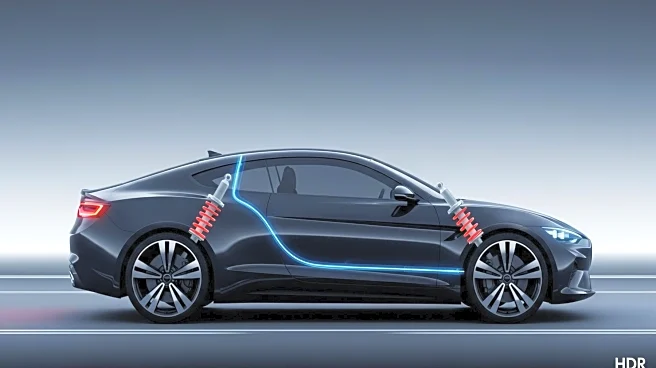What's Happening?
BYD, a leading electric vehicle manufacturer, has filed patents for two distinct methods of suspension energy recovery, aiming to enhance vehicle efficiency. The first method involves a vehicle vibration reduction assembly using a ball screw mechanism to convert suspension motion into electrical energy. This system integrates a motor/generator within the damper, potentially increasing power as the suspension compresses. The second method utilizes a hydraulic suspension system that transfers energy from suspension movement to pump hydraulic fluid, which is then converted into electricity or stored as pressure. These innovations reflect BYD's commitment to improving vehicle performance by actively capturing energy from suspension motion, which could lead to increased net vehicle efficiency.
Why It's Important?
The development of suspension energy recovery systems by BYD represents a significant advancement in electric vehicle technology. By capturing energy from suspension motion, these systems could improve overall vehicle efficiency, potentially reducing energy consumption and enhancing performance. This innovation is particularly relevant as the automotive industry seeks sustainable solutions to meet increasing environmental regulations and consumer demand for efficient vehicles. The ability to recover energy from suspension systems could also lead to cost savings for consumers and contribute to the broader adoption of electric vehicles. As BYD continues to innovate, these technologies may set new standards in vehicle design and efficiency.
What's Next?
BYD's patented suspension energy recovery systems are likely to undergo further testing and validation before being integrated into production vehicles. The company may initially apply these technologies to premium models, with potential trickle-down to more accessible vehicles over time. As these systems are refined, BYD could collaborate with other automotive manufacturers or suppliers to expand their application across the industry. Additionally, consumer feedback and market demand will play a crucial role in determining the success and widespread adoption of these innovations. The automotive industry will be closely monitoring BYD's progress in this area.
Beyond the Headlines
The introduction of suspension energy recovery systems by BYD could have broader implications for the automotive industry, including potential shifts in vehicle design and manufacturing processes. These technologies may influence the development of new standards for vehicle efficiency and performance, prompting other manufacturers to explore similar innovations. Additionally, the focus on energy recovery aligns with global efforts to reduce carbon emissions and promote sustainable transportation solutions. As these systems become more prevalent, they could contribute to a cultural shift towards prioritizing energy efficiency in vehicle design.










